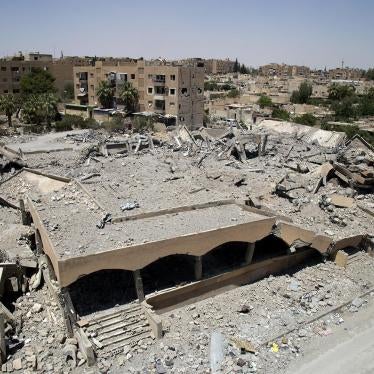(Beirut) - Middle East and North African governments should follow Iraq's example and sign the International Treaty Banning Cluster Munitions, Human Rights Watch said today. Iraq signed the treaty on November 12, 2009, joining only two other countries in the region - Lebanon and Tunisia - as signatories to the Convention on Cluster Munitions, which prohibits the use, production, transfer, and stockpiling of these weapons.
"Iraq has experienced first-hand the devastating effects of cluster munitions, and its government has promised never to use this weapon," said Sarah Leah Whitson, Middle East Director at Human Rights Watch. "Whatever excuses Middle East governments have given for not signing this treaty, Iraq's example shows they won't hold up."
US-led Coalition forces used large numbers of cluster munitions - which leave behind lethal submunition duds that can kill for years - in Iraq in 1991 and 2003. During the Gulf War in 1991, the United States, France, and the United Kingdom dropped 61,000 cluster bombs containing 20 million submunitions in Iraq and Kuwait. In 2003, the US and UK used nearly 13,000 cluster munitions containing an estimated 1.8 to2 million submunitions during the three weeks of major combat. The United Kingdom has signed the treaty, and France has ratified it, but the United States is not a signatory.
Although Iraq is not known to have used cluster bombs before 2003, the country produced, imported, and stockpiled the weapons. Cluster munitions have been used in other parts of the region - in particular in Lebanon, Kuwait, Israel, Saudi Arabia, Syria, Libya, and Western Sahara - with ongoing devastation and loss long even after the conflicts have ended. Egypt, Iran and Israel also have produced cluster munitions; Egypt and Israel have exported them.
The need for an international treaty to ban cluster munitions became even more evident after Israel's massive use of these weapons in southern Lebanon in 2006. These weapons left large swaths of the country contaminated by the deadly unexploded submunitions, which since the end of fighting have killed or wounded 218 civilians as well as 47 people who were trying to locate and remove them.
"Civilians, often children, are the victims of cluster munitions, which to this day continue to kill and maim innocent people throughout the Middle East from conflicts long since ended," Whitson said. "Iraq, Lebanon, and Tunisia should persuade neighboring governments to help create a Middle East free from these vicious weapons."
The Convention on Cluster Munitions represents a major advance in protecting civilians both during and after armed conflict. In addition to banning cluster munitions, it requires the clearance of affected areas within 10 years and destruction of stockpiled weapons within eight years, and includes assistance provisions to help affected nations with clearance and victim assistance.
A total of 103 countries have signed the convention, which opened for signature in December 2008. Twenty four have ratified it, though none are in the Middle East. Thirty ratifications are needed for the convention to enter into force and become binding international law.
"The next step is for the governments of Iraq, Lebanon, and Tunisia to ratify these treaties, and to demonstrate leadership in the efforts to ban this weapon permanently."







